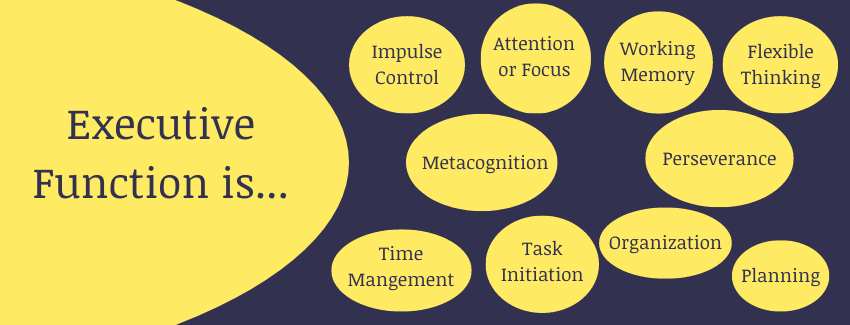Ten Essential Skills That You Have Never Been Taught
Jul 25, 2024

“Prepare the child for the path instead of the path for the child.” - T. Elmore
As a teacher and as a parent, I can think of nothing more valuable than having children feel comfortable in their own skin, confident about themselves, and able to communicate their needs with others. Here at Horizon Academy, we began incorporating explicit instruction of Executive Functioning skills because we thought this would be beneficial for our students’ academics (especially for students with dyslexia and other language-based learning disabilities). However, it is becoming so much more than that.
Executive Functioning (EF) skills are the ten cognitive habits that we use to learn, work, and manage our everyday lives. These skills are hugely important in life - yet are rarely, if ever, taught.
- Impulse Control or Inhibition (also known as self-control; being able to stop and think before you act)
- Attention or Focus (being able to focus on a person or task for a given period of time)
- Working Memory (being able to hold information in our minds while working with it)
- Flexible thinking (being able to adapt to new situations and cope effectively with change)
- Perseverance (also known as grit; sticking with a task and not giving up, even when it is challenging)
- Time Management (having an accurate understanding of time in order to work efficiently)
- Task Initiation (being able to independently start a task or activity)
- Metacognition (also known as self-talk; checking in with oneself to help learn and complete tasks best)
- Organization (creating and maintaining a system to stay neat, orderly, and on track)
- Planning (making a strategy to complete a task or goal)
These important skills are often taken for granted or assumed they will be “picked up naturally.” Yet, this often is not the case. For our kids, students who have dyslexia, dysgraphia, dyscalculia, and/or ADHD, EF skills are essential.
When Covid hit, many families were home together. Adults brought their work home, kids had school at home, and these two worlds collided. Home life and work/school life attempted to coexist. A family friend’s teenager’s EF struggles went largely unnoticed until COVID-19 hit. Once he had to self-manage at home, surrounded by the distractions of technology and without the consistency and routine of a structured learning environment, things started to fall apart academically and then emotionally. The lack of strong EF skills became exposed.
Over time, I heard from families who were struggling with similar issues. It is no wonder anxiety has become a part of our lexicon! In recent years, ADHD has more accurately been described as an “executive functioning” disability rather than simply the old stereotype of someone who “can’t pay attention,” or “is all over the place.”
Fortunately, Executive Functioning skills CAN be taught.
Horizon is leaning into EF skills, and the results have been amazing. Because we use the Orton-Gillingham approach, we explicitly teach the ten executive functioning skills one at a time, sequentially building upon each skill, from the simplest to the most complex, using multisensory strategies. We pair each EF skill with a nonverbal sign, model examples, and non-examples, plan an activity or two, and embed a lot of reflexive questioning. Reflexive questioning is a key executive function tool that provides the child with the opportunity to self-direct rather than be directed by someone else. This approach helps the kids think for themselves, reflect, and become more aware of their thoughts and actions throughout their day. Our counseling team complemented our EF unit with classroom instruction about the brain and how it works.
Recently my students did a self-inventory of EF skills, and the discussion was eye-opening: The awareness of these ten skills has been a game changer. Fourth graders realized that if they marked something high but others said it was low then maybe they did not know themselves very well. Some shared how their EF struggles were the same as their parents, and others noticed that some EF skills were strong at school but not at home or vice versa. Impressive observations, right? The kids wanted to share their inventories with their parents and have their entire family do it, too. It is no longer uncommon to hear a student say things like “Can you slow down? My working memory needs to catch up.” or “This is so hard, but I can persevere.”
Of all the many positives that have resulted from our EF instruction, the single most important benefit I am observing is our students’ increased self-advocacy skills. The real lesson in helping students to learn about Executive Functioning is about Empowerment.
Teri Truog, Lower School Teacher at Horizon Academy
Note: Horizon Academy empowers students diagnosed with dyslexia and other language-based learning disabilities to become effective learners and confident self-advocates. We are the only school west of the Mississippi River accredited by the Orton-Gillingham Academy. The Orton-Gillingham (O-G) Approach is the gold standard for teaching kids with dyslexia. Please visit our website for more information: www.horizon-academy.org
For more information on the Orton-Gillingham Approach, please visit: https://www.ortonacademy.org/
Executive Functioning (EF) skills are the ten cognitive habits that we use to learn, work, and manage our everyday lives. These skills are hugely important in life - yet are rarely, if ever, taught.
